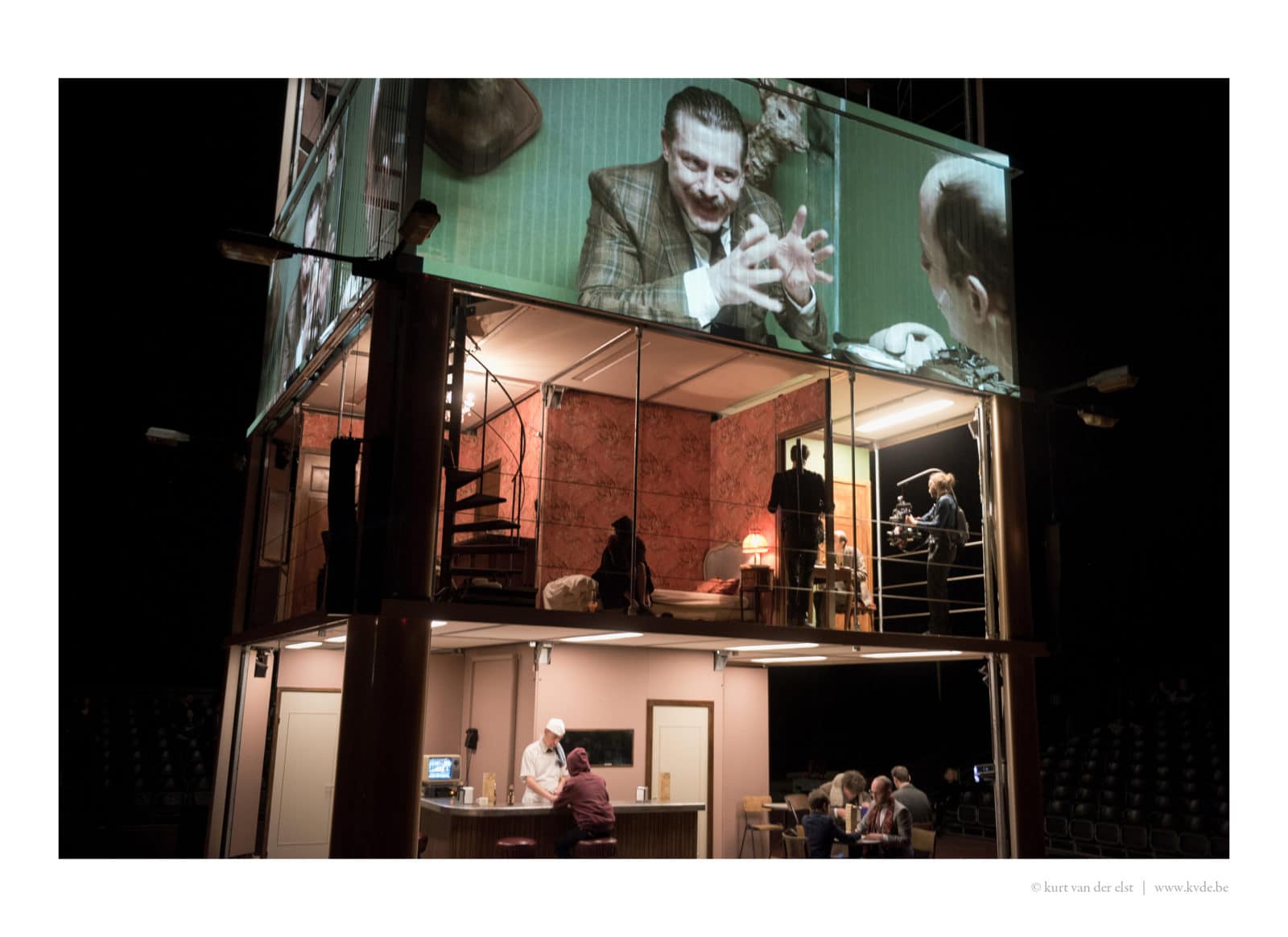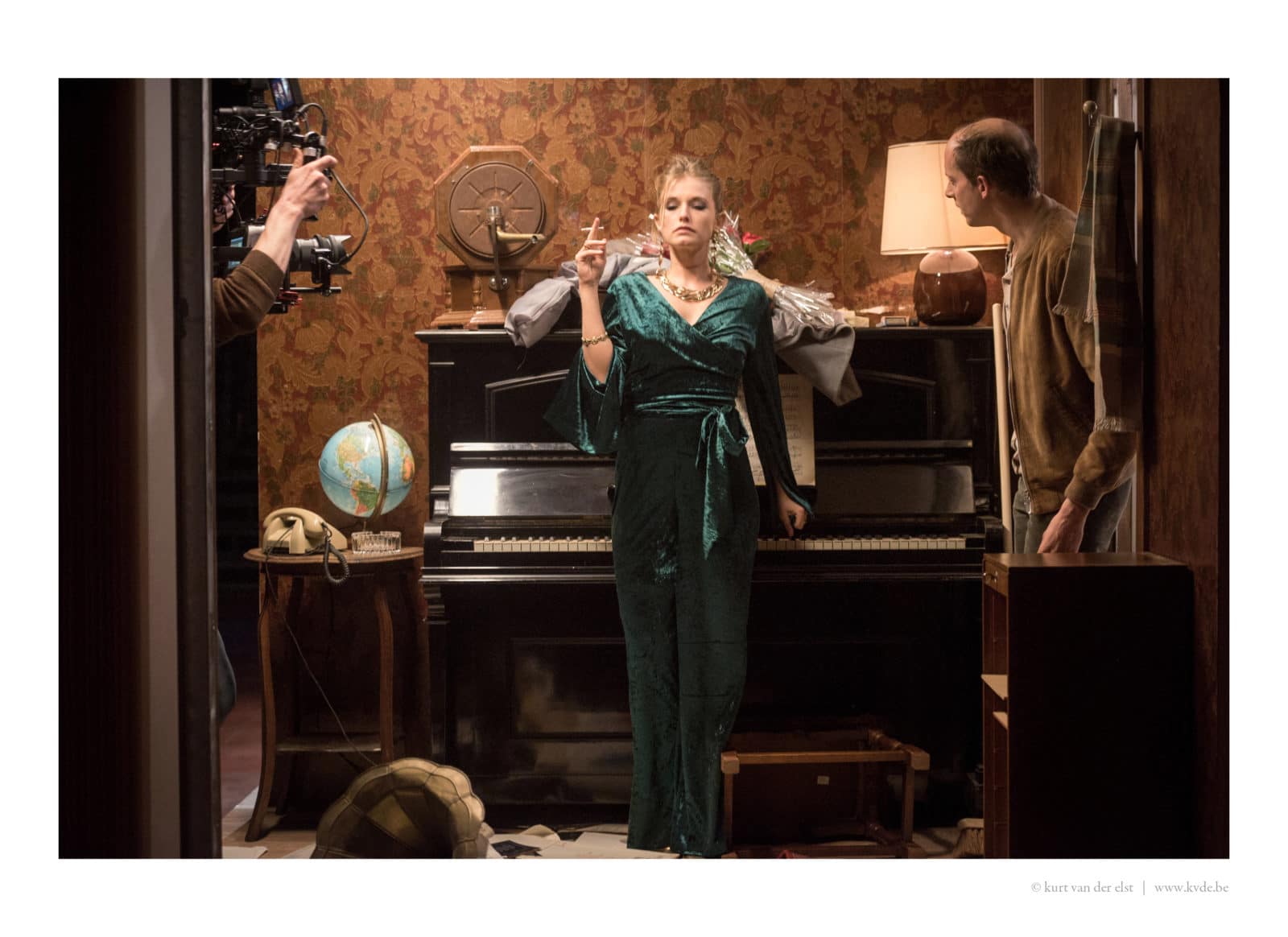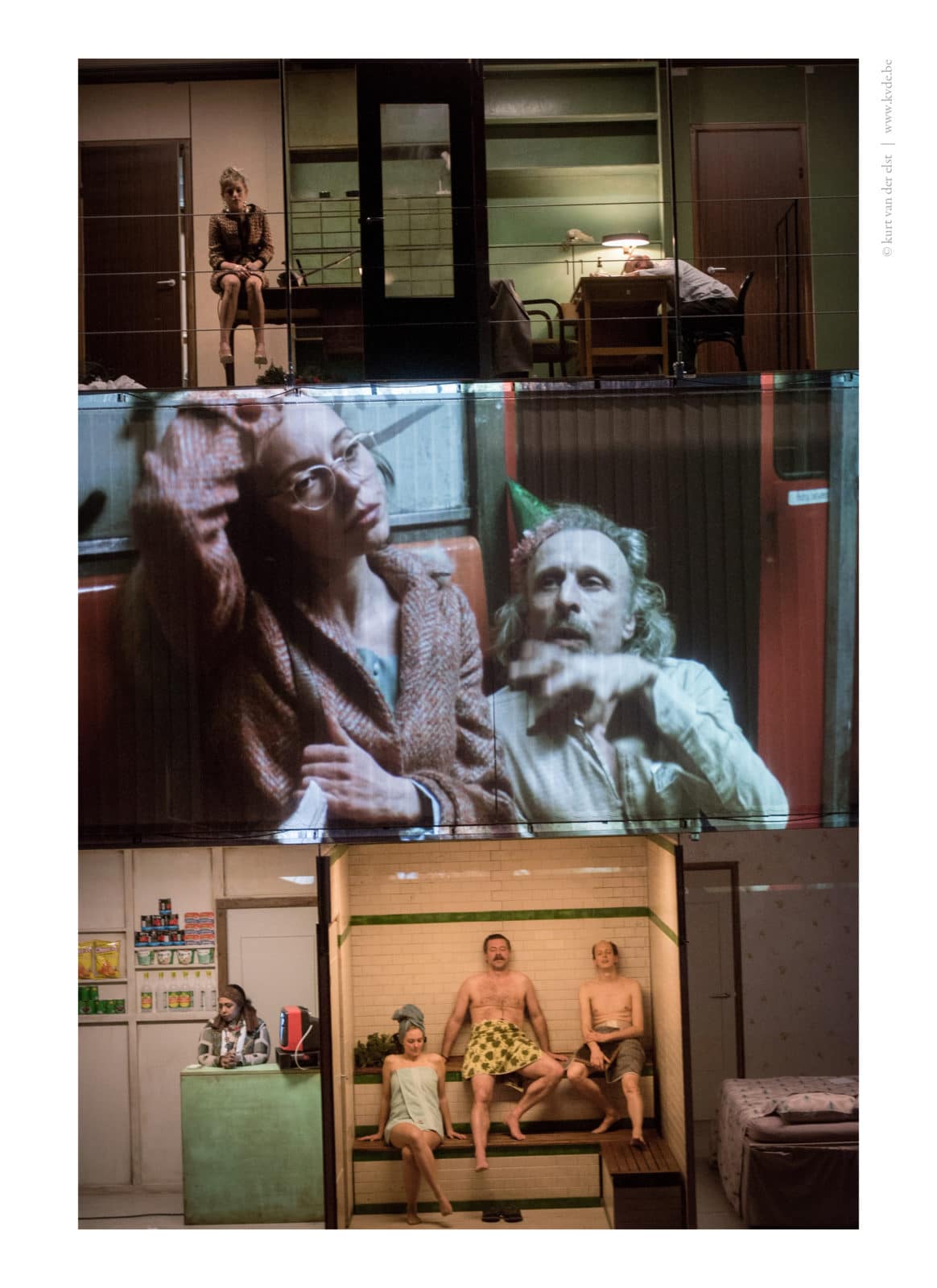Beluister hier een sfeerimpressie en het volledige interview met Stef Aerts.
Kinderen hebben het vermogen de wereld van volwassenen op zijn kop te zetten. De elfjarige JR maakt het wel heel bont. Hij leert op een schoolreisje hoe de beurs werkt en zet deze vervolgens naar zijn hand. Daarbij niet gehinderd door een prefrontale cortex, dat deel van de hersenen dat ons geweten bevat, en dat bij kinderen en pubers nog niet bestaat. In 700 pagina’s, gevuld met niets dan dialogen zonder karakteraanduidingen, beschrijft de Amerikaanse schrijver William Gaddis in 1975 hoe catastrofaal en verstrekkend de gevolgen zijn als op de beurs een kind de was doet. FC Bergman, een nog relatief jonge Vlaamse theatergroep, maakt er nu een vier uur durend theaterspektakel van.
JR is een boek dat van zichzelf alweer een soort legende is. Volgens kenners is het hét boek over de ondergang van het kapitalisme en wijst het – hoewel geschreven in de jaren zeventig – vooruit naar de beurscrisis van deze eeuw en de opkomst van Donald Trump. Maar, wereldberoemd als het is, is het ook onleesbaar geacht en nog nooit vertaald in het Nederlands. Het werk is hier vooral onbekend.
Ivo van Hove
JR dook als boek voor het eerst een jaar of drie geleden op bij de makers van FC Bergman. Oorspronkelijk was het bedoeld voor een samenwerkingsproject met Toneelgroep Amsterdam, maar artistiek leider Ivo van Hove bleek uiteindelijk andere plannen te hebben. Stef Aerts, een van de oprichters van FC Bergman en regisseur van deze productie, werd echter meteen verliefd op het boek, en vroeg of ze het stuk dan zelf zouden mogen maken. Dat mocht.
‘Marie Vinck is bij ons toen begonnen met het uitwerken en vooral uitsplitsen van de dialogen, wat een huzarenstuk is.’
Want het boek bestaat uitsluitend uit dialogen?
‘Op een paar transitietekstjes na, ja.’
Dan kan ik me voorstellen dat je als theatermaker denkt: volia, een kant en klaar toneelstuk.
‘Ja, maar wij werken zelden of nooit met tekst. Dus we dachten alleen ergens in het begin wel dat we kant en klare, heerlijke dialogen geserveerd kregen. Wat ook zo is, want de dialogen zijn fantastisch, ook in het boek al. Maar om van 700 pagina’s echte literatuur naar een behapbare toneeltekst te gaan, lukt niet zomaar.’
De dialogen zijn niet zo even te monteren?
‘Nee, want ze zijn heel uitgebreid. We hebben ze ook zwaar moeten inkorten. Komt bij: ze waren nog nooit vertaald. Wel in het Duits en het Frans, dus daar hebben we ons van kunnen bedienen. We zijn geholpen door de universiteit in Brussel. De tolk-vertalingsdienst heeft voor ons een soort werkvertaling gemaakt. We hadden daar onze handen vol aan.’
Spreektaal
‘Maar wat het ook niet super voordehandliggend maakt, is dat de dialogen zijn geschreven in spreektaal. Dus inclusief alle gestotter en haperingen. Dat maakt het heel charmant om te lezen, maar ook best vermoeiend. Het is echt een werk om door te geraken. Maar het is dankzij die haperingen dat gestotter en al die stopwoordjes dat je de personages herkent, want in het boek worden de personages niet aangeduid: er staan alleen streepjes. Je bent dus al een tijdje zoet met uitmaken wie wat zegt.’
Dus dat was al een heidens karwei. Maar ook daarna maak je het jezelf niet makkelijk. Het decor is een vier verdiepingen hoge flat, het publiek kan er van vier kanten naar kijken, er lopen twee cameramannen rond. En je ziet als toeschouwer nog niet alles.

‘Het idee om met film te werken kwam vrij snel omdat we de dialogen zo ongelooflijk filmisch vonden. Ze deden ons direct denken aan de films uit de jaren zeventig van Woody Allen, of zelfs de vroege films van Paul Thomas Anderson. Dat er van dat boek niet eerder een film is gemaakt is gewoon bizar. Maar wij wilden het onderzoek dat we eerder naar film en theater deden, hiermee voortzetten. Dus dat we twee camera’s zouden gaan gebruiken stond al heel snel vast. Met één camera werken was voor dit stuk niet te doen.’
Entropie
‘We hebben pas later bedacht om het driedimensionaal te maken. Het kwam omdat we steeds meer begraven werden in de chaos van dat boek, en de chaos die dat boek ook wil zijn. Ik vond al snel dat met een normale toneelsetting de entropie van het boek niet te vatten was. Dus was ik op zoek naar iets wat het publiek ook zou dwingen om keuzes te maken, en wat het publiek ook het gevoel zou kunnen geven dat het niet alles kon zien en niet over alle informatie kon beschikken die er werd meegedeeld. Dat is namelijk ook het gevoel dat je krijgt als je het boek leest, zeker voor de eerste keer.’
Het is wel een risico dat je neemt.
‘Of dat een risico is. Ik vind het ook bij het leven horen. Het is eigenlijk heel mooi. Juist nu, in deze tijd waar het steeds gaat om fomo, the Fear of Missing Out: je kunt gewoon niet overal bij geweest zijn. Dat is al heel erg in dat boek aanwezig. Een wereld waarin alle informatie al voorhanden lijkt te zijn, maar dat je er vooral de hele tijd achteraan holt, omdat er altijd mensen zijn die meer weten dan jij en meer macht hebben. Dat is een heel frustrerende staat van zijn, maar ook hoe de wereld in elkaar zit. Daarom ben ik juist wel blij met wat die toren bij het publiek teweeg brengt. Dat was de opzet, en ik denk dat we daar ook wel in slagen.’
Ongrijpbaar
De JR, het elfjarige jongetje uit de titel van het boek en de voorstelling, is eigenlijk nauwelijks in beeld. Is dat in het boek ook zo?
‘In het boek is hij de rode draad, en eigenlijk de aanstuurder van alles wat de overige personages overkomt, maar hij is geen psychologisch hoofdpersonage. Hij is vooral een concept. We leren hem ook nooit heel erg kennen. We komen weinig meer over hem te weten dan dat hij een klein genie is. Dat vind ik mooi. Hij is duidelijk de personificatie van het kapitalisme, en daarom blijft hij een ongrijpbare kracht. We hebben hem in de voorstelling nog ongrijpbaarder gemaakt dan hij in het boek is: een soort Citizen Kane of Great Gatsby: iemand waar iedereen altijd naar op zoek is, en legendes over rondstrooit.’
Ik had eigenlijk verwacht dat het stuk veel meer zou gaan over financiële constructies en malversaties. Bij de inleiding vooraf aan de voorstelling door een financieel journaliste ging het ook alleen maar over de banken en de crisis en de gevaren voor een nieuwe meltdown van de economie. In het stuk geen woord daarover. Jullie gaan vooral in op de personages en hun persoonlijke leven.

‘Dat komt omdat we absoluut geen experts zijn op het vlak van de economie en de hele financiële wereld. Ik vind het wel een heel interessante en boeiende wereld, maar ik weet er te weinig van om het in een voorstelling te verwerken. Het was nooit de bedoeling om een statement te maken over het kapitalisme of de financiële wereld. Daar ben ik gewoon niet onderlegd genoeg voor.’
Vakjargon
‘Dat is niet de eerste reden waarom we het boek hebben gekozen. Het is vooral vanwege de rijke en mooie schildering van de personages. Het is ook een bijzondere ervaring om je door een boek te worstelen dat knalvol staat van het vakjargon en van de financiële constructies waar je een greep op moet proberen te krijgen als lezer, maar dat lukt meer dan helft van de tijd niet. Daar is ook een heel groot deel van de werktijd naartoe gegaan. We hebben die ook uiteindelijk versimpeld en behapbaarder gemaakt. We wilden niet dat je als publiek gefrustreerd zou raken omdat je behalve het ingewikkelde verhaal ook nog een hoop beursjargon zou moeten snappen. Ik hoop dat we het ingewikkeld genoeg houden om een idee te geven van die wonderlijke taal van het geld.’
Je hebt ervoor gekozen om het in de jaren zeventig te laten: vaste telefoons, kleding, inrichting. Heb je er ook over gedacht om het naar nu te halen? De parallellen met nu zijn immers erg sterk.
‘Daar hebben we heel kort over gedacht. In het design hebben we nu gezocht naar iets tijdloos. Dat doen we meestal in onze voorstellingen, maar nu werden we geconfronteerd met basismateriaal dat heel erg jaren zeventig was. Daar konden we niet omheen. Probleem was ook dat we bij het overzetten naar deze tijd ons verhaal kwijt waren. In het boek wordt het drama de hele tijd veroorzaakt door miscommunicatie, door telefoons die verkeerd verbonden zijn, mensen die telefoons missen en daardoor relaties mislopen. Brieven die de hele tijd niet worden opengemaakt.’
Geest van het boek
‘Als je die personages een gsm of e-mail geeft dan is ons verhaal na tien minuten al klaar. Dan is er geen drama meer. Of we hadden alles moeten omwerken, en dat zou ik jammer hebben gevonden. Dan zou de geest van het boek verloren zijn gegaan. Terwijl de voorstelling nu duidelijk maakt dat de virtuele overload die we nu ervaren, in die tijd juist heel erg tastbaar was door een hele grote hoeveelheid papier en karton en een enorme hoeveelheid rinkelende telefoons.’
Even iets anders: hoe regisseer je zoiets?
‘We zijn begonnen met een maquette van het decor. Het scenario hebben we aan de hand van die maquette geschreven. Dat was precisiewerk. het staat in vier kolommen, met al die parallelverhalen naast elkaar. Het is vooral een kwestie van kalm blijven en alles stukje voor stukje aanpakken. We hebben ons eerst alleen met de film bezig gehouden. Dat is het verhaal dat iedereen te zien krijgt. Als dat niet helemaal klopt, is het einde zoek. Toen we de film eenmaal kloppend hadden zijn we daarna op de maquette de livebeelden gaan schrijven. In de praktijk betekende dat we bij de repetities veel onnozel heen en weer geloop hadden. Tijdens de laatste week hebben we heel erg geoefend met ’toertjes’ lopen.’
Met zo’n voorstelling in de rondte heb je ook grote tribunes. Er is plaats voor 1200 man. Nooit angstig dat het niet vol zit?
‘Het voordeel is dat we in België niet zoveel moeite hebben met de zaal uitverkopen. Nog voor de première was alles al uitverkocht. De stress was dus enorm. Hoe dat in Amsterdam gaat: het is hopen dat de tribunes vol raken.’
Paarden
Jullie zijn een vrij uniek gezelschap.

Toen wij zo’n tien jaar geleden begonnen waren er weinig groepen die zich zo op grootschalig beeldend theater richtten als wij. We zijn echt kinderen van onze tijd, opgegroeid met beeldcultuur. We bedienen ons graag van grote gebaren. Dat was al met onze allereerste voorstellingen. Nog zonder budget. Daar liepen ook paarden in rond en veel figuranten. We zetten ons daarmee een beetje af tegen de opleiding waar we vandaan kwamen. Het Conservatorium is een vrij klassieke, maar heel erg goede, tekstgerichte opleiding. Wij gaven ook op school onze voorstellingen al heel erg vorm. En dan waren we gefrustreerd omdat we daar nooit op werden beoordeeld. We werden individueel als spelers beoordeeld, maar niet als kunstenaarsgroep. Het is deels daardoor dat we later, na ons tweede jaar op het Conservatorium, FC Bergman zijn begonnen met voorstellingen zonder tekst en met veel vorm.’
Mocht dat van school?
‘We waren heel vaak absent, dus het werd ons niet in dank afgenomen. Maar we hebben nog steeds goede relaties met de school, enkelen van ons geven er ook nu nog les. De vrouw die de opleiding heeft gesticht, Dora van der Groen, heeft ook postuum nog steeds grote invloed op ons werk. Juist ook op het beeldende aspect van de voorstellingen.’
